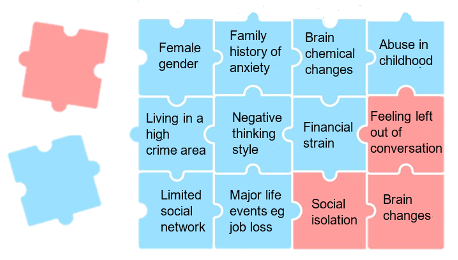
Exploring the links between hearing loss and susceptibility to developing anxiety

About the study
One in six people in the UK are affected by hearing loss. Adults with hearing loss are more likely to have an anxiety disorder and this likelihood increases with greater severity of hearing loss. There are different reasons for the association between hearing loss and anxiety. These may include difficulty in keeping up in conversation, embarrassment in social situations, sensory deprivation, or feeling disoriented in busy places.
Hearing loss is associated with changes in the structure and function of areas of the brain that are involved in hearing (a sensory system). The sensory systems form the first part of interlinked brain regions, called the anxiety circuit. The anxiety circuit coordinates an anxiety response. It is possible that changes in the structure and function of the sensory systems may alter how the brain processes anxiety. These brain changes may mean that the anxiety processing regions become more sensitive to developing an anxiety response. If this is so, this may contribute to the higher rates of anxiety disorder found amongst people with hearing loss.
Anxiety is complex, so a ‘model system’ has been developed to study anxiety. The model involves people breathing air that contains a greater proportion of carbon dioxide than the air around us. The higher proportion of carbon dioxide can trigger a mild anxiety response (which resolves within a few minutes of breathing normal air). Even though breathing in carbon dioxide isn’t the typical reason people get anxious day-to-day, the model has previously been used many times and has helped us to understand more about anxiety.
Study outline
In the current study people with hearing loss and people with hearing in the normal range (who do not have an anxiety disorder) will breathe in air with a greater proportion of carbon dioxide. We anticipate that people with hearing loss will have a slightly greater anxiety response to carbon dioxide because of alterations in parts of the brain involved in processing anxiety.
Study process

Value of the study
This study is important as it will help us better understand changes in the brain circuits that process anxiety as well as hearing. This may highlight key areas of the brain that can be studied further to develop focused treatments for anxiety disorders. This is beneficial as it could guide more individualised, targeted treatment for people living with hearing loss and anxiety disorders.
How to find out more or take part
If you are interested in learning more about this study or taking part, please contact the lead researcher, Dr Bethan Impey, by contacting:
Email: bi1g08@soton.ac.uk
Phone: +44 (0)2382 310764
Further information about potential risk factors and causes of anxiety disorder:
Risk factors/potential causes of anxiety disorder: This image shows some of the known risk factors for anxiety. The blue jigsaw pieces illustrate risk factors in the general population. The pink jigsaw pieces illustrate additional risk factors that may be present for those with hearing loss. As a population, people with hearing loss may have the same potential anxiety risk factors as the general population and then have additional risk factors through hearing loss – this may explain the higher overall rates of anxiety disorder in those with hearing loss. The risk factors do not mean that an individual will definitely develop anxiety (whether they have normal hearing or hearing loss), but there may be an increased likelihood. The blank pieces illustrate that there are probably multiple other reasons that a person may develop anxiety.
